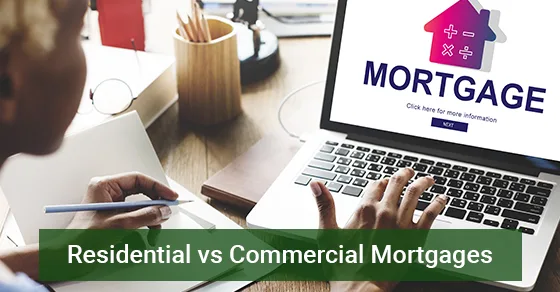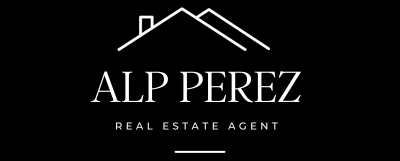The Comparative Analysis of Residential vs. Commercial Mortgage Investments
The real estate market has been a magnet for investors in recent years. The allure? The potential for a lucrative secondary income stream – a steady flow of rental income that fuels your financial goals. But for aspiring real estate moguls, a critical question arises: residential or commercial property?
Both options offer unique advantages, but which path is right for you? Don’t worry; this blog will be your compass! We’ll navigate the key distinctions between residential and commercial investments, unpacking the pros and cons to empower you to make informed decisions and unlock your real estate riches. Whether you’re a risk-averse investor or seeking high-powered returns, we’ll unveil the investment landscape to help you chart your course to real estate success.
What Are Residential Properties?
Within the vast landscape of real estate investment, residential properties offer a familiar starting point. These are spaces designed for people to live in, encompassing:
Single-family homes: Your classic standalone house, ideal for families or individual households.
Duplexes: Think of two living spaces stacked on top of each other, sharing a common structure but with separate entrances.
Multi-family homes: These properties, like apartments or condos, house multiple families or tenants within a single structure.
Mobile homes: These provide a more flexible option, offering transportable living quarters.
For investors, the beauty of residential properties lies in their potential to generate steady rental income. By leasing out your property to tenants, you can create a reliable secondary income stream. This section of the blog will delve deeper into the advantages and disadvantages of residential real estate investments, helping you decide if this path aligns with your financial goals.

Pros and Cons of Residential Investments
Residential real estate offers a compelling entry point for aspiring investors. Here’s a breakdown of the key advantages and potential drawbacks to consider:
Pros: | Cons: |
Lower Vacancy Risk: Generally, residential properties tend to fill vacancies faster compared to commercial spaces (with some exceptions). This translates to a more consistent rental income stream. | Potential for Lower Returns: While residential properties offer rental income, the overall cash flow might be lower compared to commercial properties. Additionally, maintenance costs can occasionally disrupt your income flow. |
Accessibility: The initial investment for residential properties is often more manageable than for commercial properties. This makes it a more realistic option for first-time investors who might need more capital for a large down payment on a commercial building. | Tenant Management: Unlike commercial tenants, who are often businesses with a vested interest in maintaining a good relationship with the landlord, residential tenants can be unpredictable. There’s always a risk of encountering irresponsible tenants who might damage the property or leave abruptly. |
Simplified Process: The buying process for residential properties can be more streamlined compared to commercial properties. There are typically fewer legal hurdles and approval processes involved. | Shorter Lease Terms: Residential leases typically last for shorter durations (6-12 months) than commercial leases. This can lead to more frequent vacancies and the need for regular advertising to find new tenants. |
Residential real estate offers a familiar and potentially stable investment option, especially for those starting. While the potential returns might be lower than commercial properties, the accessibility, lower vacancy risk, and simpler buying process make it an attractive choice. However, it’s crucial to factor in tenant management challenges and shorter lease terms when making your investment decision.
What Are Commercial Properties?
Commercial real estate beckons investors with the promise of potentially lucrative returns. These properties, designed for business use rather than living quarters, offer a distinct investment experience compared to residential options. Here, we explore the pros and cons of venturing into the commercial realm:
Pros: | Cons: |
Stronger Cash Flow: Commercial properties can generate significantly higher rental income compared to residential properties. The specific earnings potential depends heavily on the location and type of property. Still, the potential for higher returns is undeniable. | Steeper Investment: Commercial properties generally require a substantial upfront investment compared to residential properties. This can be a barrier to entry for some investors. Carefully assess your financial resources before venturing into this space. |
Long-Term Leases: Unlike residential leases with shorter durations, commercial leases are often structured for longer terms, ranging from 10 to 20 years. This translates to greater stability in your rental income stream and reduces the frequency of vacancy periods. | In-Depth Research Required: Investing in commercial real estate demands thorough research. You’ll need to consider factors like zoning laws, local taxes, and the property’s rental income potential. Solid market knowledge is crucial for making informed decisions. |
Lower Management Costs: Commercial tenants are typically businesses responsible for furnishing and maintaining the leased space. This can significantly reduce your ongoing expenses as an investor. | Stricter Loan Terms: Securing financing for commercial properties often involves higher interest rates and more stringent terms compared to residential mortgages. The property’s location and your repayment period will also influence the loan’s terms. |
Commercial real estate offers the potential for impressive returns, but it comes with a higher upfront investment and greater complexity. Thorough research, a strong financial foundation, and seeking professional guidance are crucial before embarking on this investment path.

The Final Chapter: Choosing Your Investment Path
The world of real estate investment presents exciting possibilities. Still, the choice between residential and commercial properties hinges on your individual goals and risk tolerance. Here’s a quick recap to empower your decision:
Residential: A fantastic starting point, offering lower upfront costs, potentially steady rental income, and a familiar investment landscape. However, cash flow might be lower, and managing tenants can take time and effort.
Commercial: The potential for high returns and long-term leases is undeniable. However, this path requires a significant upfront investment, in-depth research, and stricter loan terms.
By understanding the advantages and disadvantages of residential and commercial real estate, you’re well-equipped to make informed investment decisions and unlock your real estate riches. And remember, if you’re considering venturing into commercial real estate, consulting with a financial advisor or commercial real estate professional can be a valuable step towards success.
About The Author
ALP PEREZ
Alp Perez is a Montreal based award winning real estate agent assisting home buyers and sellers in Montreal and surrounding areas. His real estate services include but not limited to: Price analysis based on the comparable listings sold in your area , Market Analysis for sellers and buyers, Recommendations on how to increase the value of your property , Customized Search engine marketing campaigns for each property, Negotiating on behalf of the buyer / seller depending on who he represents in the deal, Connecting buyers and sellers with his well known industry partners such as inspectors, mortgage brokers, notaries, land surveyors, renovators and etc. Whether you are A homeowner looking for the best real estate agent to get top $ for your property and sell your house or condo fast , A buyer looking for MLS agent Feel free to reach out to him at (514) 527-2022 or via his email : alpperez@realtormontreal.ca


